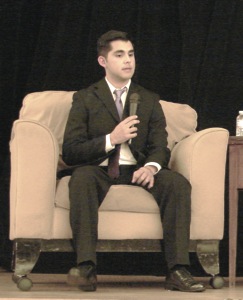san diego
Gay veteran recounts years of hazing, harassment in the Navy
‘Don’t Ask, Don’t Tell’ resolution passes final Assembly committee
Published Thursday, 21-Jan-2010 in issue 1152
Veteran Joseph Rocha, who was closeted during his military service, recounted years of hazing and harassment in the Navy by fellow service members who perceived him to be gay at a Q&A forum at the San Diego LGBT Community Center, last Tuesday.
“Legitimately, I wasn’t gay. I didn’t have gay friends. I didn’t have gay sex,” Rocha said. “That was the most frustrating.”
Rocha entered the Navy in 2005 and was stationed in Bahrain, a small island country in the Persian Gulf, where he trained and worked with dogs to detect explosives and search for enemy combatants. Through a period of twenty eight months, Rocha was taunted and physically humiliated by his chief and fellow service members. The abuse included being “tied to a chair and locked in a feces-filled dog kennel” to being “forced to simulate oral sex” in front of other comrades. Last fall, Rocha came out with his story to various news publications and has since been giving talks about his experience at gay events and colleges. He’s also been working with state and national government officials to repeal “Don’t Ask, Don’t Tell,” the ban that prevents gay and lesbian service members from serving openly in the military.
GLTNewsNow Associate Editor Aaron Heier, who moderated the Q&A called Two Cents, asked Rocha about his early life, activism and military service. One of the first questions Heier asked Rocha was to describe how the abuse he experienced in the Navy started.
“It began with my comrades asking, ‘Let’s buy you a prostitute.’ And I said, ‘I didn’t want to.’ And my comrades asked, ‘Well are you a faggot?’ And I just chose not to answer, which is the [“Don’t Ask, Don’t Tell] policy,” Rocha said.
“I wouldn’t have been any more compelled had it been a male prostitute or had I been straight. It’s a matter of moral character,” he added.
Rocha said that his supervisor, Chief Petty Officer Michael Toussaint, ordered and oversaw much of the abuse he received.
“I was eighteen years old. I was terrified of the guy. If you have seen him in media coverage, he’s a massive dude. I was convinced that we were in the middle of nowhere and that he had complete power over me,” Rocha said.
Rocha said he rationalized the abuse as a challenge to overcome by himself. But six months after the abuse started – he couldn’t say when it actually began – a sailor found Rocha tied up and locked in a dog kennel and reported the incident. Rocha said the incident prompted an internal investigation that led the Navy to confirm “93 incidents of misconduct, including assault, abuse and hazing” towards him and several other members of the unit. But the abuse continued, he said.
During the investigation, Rocha said the Navy decided to charge his best friend Petty Officer 1st Class Jennifer Valdivia with failing to end the abuse.
“All the original charges they were originally going to go for Toussaint, they tried to pen on her,” Rocha said. “It is my presumption that they found it a lot easier to go after a first class, than it was to go after a chief.”
Once Valdivia was informed that she would be going to a military prison, and convinced there would be no justice for her, she committed suicide, Rocha said.
“I had my moment with her and I put her on the plane that brought her back to this country,” Rocha said.
“The most beautiful thing in the aftermath is that I connected with her family, and they have become an extension of what I now consider to be my family,” he added.
After more than two years of abuse, Rocha decided he had had enough: “the suicide of a fine sailor and the Navy’s unwillingness to punish the top leadership in my unit, I was mentally and emotionally depleted,” Rocha wrote in an opinion piece in The Washington Post last October. The veteran formally ended his service at a naval academy with a resignation letter that outed himself as gay to his commanding officer.
After Rocha publicly came out with his story last fall, the Navy began an investigation into how it handled the case.
Thus far, the Navy has forced Rocha’s supervisor Chief Toussaint into retirement.
“But that doesn’t do anything because we’ll all be paying for his benefits for 30 to 40 years,” Rocha said.
Since last year, Rocha has been working with state Sen. Christine Kehoe to pass an Assembly resolution calling for the President Obama and Congress to pass the Military Readiness Enhancement Act of 2009, which would end “Don’t Ask, Don’t Tell.”
Last week, the resolution passed the Assembly’s judiciary committee, Rocha said, and now the full Assembly is ready to vote on it.
“A soldier must display courage, patriotism, commitment and ability – none of which have anything to do with sexual orientation,” Kehoe said after the resolution passed. “Overturning this shameful policy will help ensure that gay and lesbian Americans will be afforded the same opportunities as any other American who wants to serve our country.”
|
|
Copyright © 2003-2025 Uptown Publications


